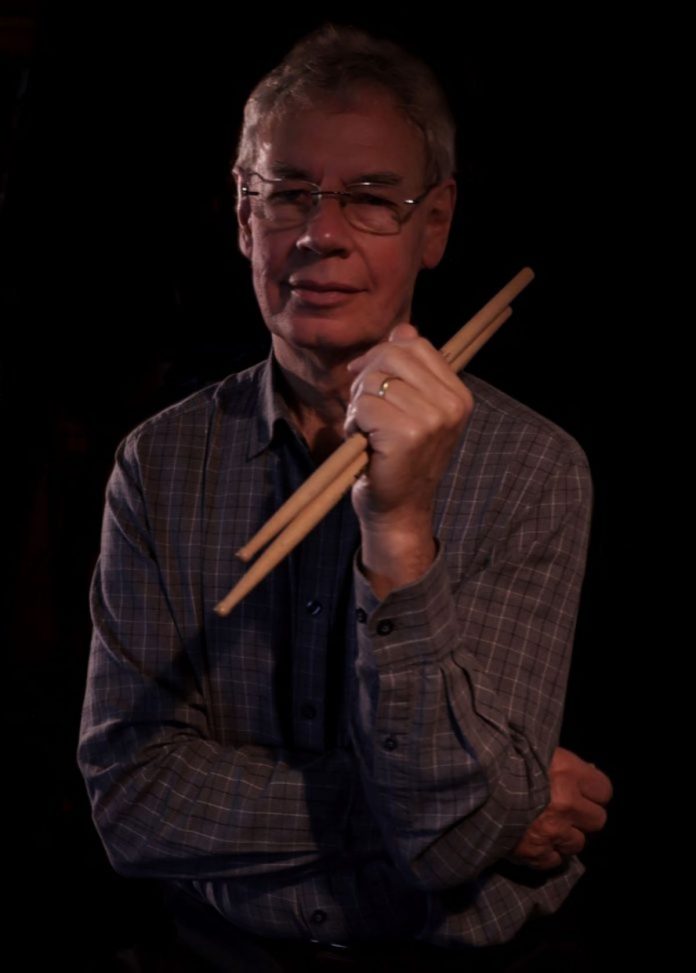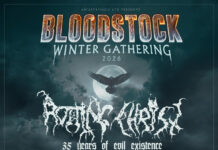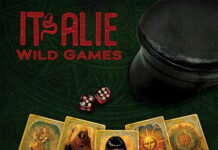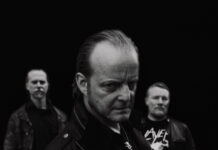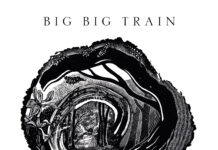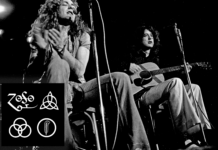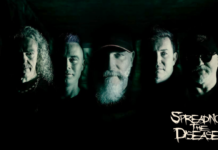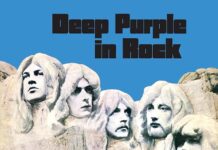Bill Bruford is one of those guys who could make you sick. A man who’s supposedly retired from the music industry but still looks ridiculously half his actual age. A drummer and percussionist who, just as you’re getting off on a band he was in, would jump ship, to explore pastures new. That some of those bands were the biggest and most critically revered in the progressive rock movement beggars’ belief, and yet that’s what he’s done, and actually much of his career might actually be better described as a more progressive career in the jazz field.
That said, he’s never been shy about coming forward, and on this bumper career retrospective he delivers the big guns from the get-go with Yes, King Crimson and UK all given their due before getting more diverse, obscure and sometimes infinitely more interesting with the numbers offered by various musical configuration across a six CD boxset entitled Making A Song and Dance: A Complete Career Collection.
“I’ve deliberately avoided forcing them into industry categories such as progressive rock, fusion’ or jazz,” Bruford commented, and gave his reasons as being “on the grounds that most of the music I’ve been associated with fits very poorly into such straight-jackets – round holes and square pegs come to mind.”
Packaged and designed by Dave McKean, the boxset comes with slipcase, poster and an extensive book penned by the drummer himself that’s forthright, its honesty veering into the questioning topic of confrontation in sundry guises, and damn it with dry-witted fun at all turns. There’s one glaring typo but I’ll forgive the proof reader if they’ll do the same for the many that will no doubt run through this feature. The CDs themselves come in 2 CD gatefold packages, each with an individual title, and from those we’ll assume you’ll git more than an inkling of what each entail. In order, they are: The Collaborator, The Composing Leader, The Special Guest and The Improvisor.
The Collaborator opens with what is now a classic Yes number in ‘I’ve Seen All Good People’ – It is that point in time where the band begin to truly get to grips with who they want to be as a collective force. A melodic lullaby for the most part, Bruford’s bass drum beats as sympathetic metronome and band-entity heartbeat as harmonies weave in and out, keyboards effecting flute sounds, and background vocals begin to be heard more profoundly singing the John Lennon lines, “All we are saying is give peace a chance”. But you most likely knew that, as too you also expectantly await the moment these very English-hippy psychedelia ideas shift, discovering what is an electric progressive rock mode, the song repeated in upbeat resilient manner, Bruford’s drumming keeping the whole thing swinging. But let’s not just focus on every time his sticks strike this or that drumskin – Let’s also discuss what he brings to the table as arranger, sometimes songwriter, and yes, even team player, notably on two more Yes tracks that follow.
‘Heart Of The Sunrise’ is often regarded as the pinnacle of that band’s formative elongated musical form; phrases zig-zagging about with technical proficiency while lyrics baffle the listener with metaphysical love poetry betwixt mortality and something more. For me, it’s with ‘And You & I’ that they actually reached their zenith. Here, the musicians embrace each other in their playing, the inspiration seemingly taking the individuals onto greater heights, while the song itself may be said to be quite a simple one, it is gifted with beauty. Back as a schoolboy I possessed its parent album, Close To The Edge, purchasing it on the recommendation of a more worldly friend, but being unable to afford a new record needle at the time couldn’t play it for the best part of a week. It was worth the wait.
That across these tracks Bruford, often demonstrates fairly simple percussive elements that mark out time, before swinging front, back and to the sides as epic sweeps of movement ensue is all well and good. However, it’s only on this particular collection I’ve noted how on ‘And You & I’ his snare adds sex appeal to its climactic cosmic orgasm. Not a characteristic one would normally associate with that band.
Now, If you have neighbours that you don’t like and want to upset on a lovely summer’s day, Bruford’s first round with King Crimson is for you – ‘The Great Deceiver’ is on the one hand a bad-assed blues for those who took one too many acid tabs, among the squeaks and torrid runs, wherein percussive elements funk up a storm. The instrumental ‘Fracture’ only ups the ante for such an outdoor horror carnival, and ‘One More Red Nightmare’ is where their raging dance of the macabre really breaks loose, Robert Fripp and John Wetton playing the ascending sharp riff while Bruford sounds like he’s ensured he’s not only brought the kitchen sink but also the dustbin lids from outside along for his infectious and incessive funky percussive rolls, all while Wetton sings of paranoia, fear in the abstract, with the overall impression that some ogre in a zoot suit’s heading our way to boogie on down.
‘Starless’ is what it is: a freaking prog rock masterpiece. Emotionally touching in its dystopian end-of-all-things manner, going through assorted changes, it’s when the instrumental section starts around five minutes in that it really begins to transmogrify – Taking their time, Fripp playing a nagging pinging guitar line repeatedly to which Wetton’s bass grunts in casual distorted distain and Bruford’s percussive elements slowly destroy all in their path, oh so very slowly and with great joy. Four minutes later they’re rocking briskly away as Mel Collins sax and Robin Milller’s oboe plays raging emotive jazz solos, before returning to the main theme then bludgeoning to a prog rock conclusion. What else could a band do but split after that. That they did so before the release of the actual album release pure madness, inspiringly so.
There’s but one track presenting U.K., the band Wetton and Bruford moved onto, along with Alan Holdsworth (previously of Soft Machine) and Eddie Jobson (Roxy Music). ‘Nevermore’ wouldn’t have been my choice of tracks from the album prior to Bruford and Holdsworth exiting. However, its placement here, proves musically poignant. It correlates with the more accessible prog rock of those times as well as tipping its head to West Coast LA soft rock, and while both would ironically lose favour commercially it hinted to where Wetton would head with the more pop-friendly mega-success debut of Asia. Time has strangely improved the number, while there are sections that wouldn’t be out of place in some middle-class London based rom-com.
On Bruford joining King Crimson he was surprised to find he wasn’t the only drummer in that grouping, with Jamie Muir also on board initially. None of their combined work is featured, but when Crimson reconvened, we find the addition of Pat Mastelotto on certain live tracks.
It is with Disc Two we find most of Bruford’s second tour-of-duty recordings with that band. At the time, I found it hard to relate to the music. Too enamoured of the previous line-up’s Red album from my schoolboy days, I recall years later holidaying in Portugal and declining to see either the new King Crimson or Dr. Feelgood because of such still-youthful prejudices. Soft -pedalling new wave sounds with added weird bits was probably my thoughts at the time. With supposed maturity, ‘Frame By Frame’ has become very special to me in the time between, and one day I’ll finish one of many half-baked novels, it’ll get optioned for a TV series and one of the dealbreakers will be ‘Frame by Frame’ will be the theme music. We must hold onto our dreams no matter our prximity towards a wooden coffin or becoming a burning edifice.
The track starts with Fripp and Adrian Belew’s guitars bouncing off the walls while a set of drums is struck with the kind of precise rolls others can only dream of, then settles into much more benign but still abstractly played guitar motifs under a gentle vocal refrain that affects to being of empowering subject matter but grows increasingly weird and morbid, yet even more fascinating.
‘Neal And Jack And Me’ is slick Nu-York funk, Zappa madness by way of the beat poets, intercut with more melodic lines. ‘Heartbeat’ is a side street where The Police might’ve had their drinks spiked and woken up playing some mean yacht rock, it’s one of most AOR like tracks you’re going to find on this collection. ‘Waiting Man’ features dancing polyrhythms two steps removed from ‘Frame By Frame’ in a kind of Paul Simon-goes-alt.rock vein then moves into a classy almost disco groove with some weird guitars soloing over it.
The sweet melodies, bolted-on prog and anthemic world music meets peace & love mantra of Anderson, Bruford, Wakeman, Howe’s ‘Brother of Mine (Radio Edit)’ sounds out of place next to these other tracks, of its time, and yet remind me what a fantastic Sunday night I had watching this act live. I’d previously seen Bruford perform with UK, but they didn’t truly excel live, with this Yes-offshoot, Bruford, who was performing on an electronic drum kit was the absolute star of the show.
Bouncing back to King Crimson – ‘Sex Sleep Eat Drink Dream’ is the blues by way of latter-day Beatles, and among the live tracks, instrumental ‘Larks’ Tongues in Aspic: Pt 2’ is harsh jazz fusion, and one day they’re going to make an AI robot that can dance like Fred Astaire and Michael Jackson, but the only tune it’ll be able to show off its moves is to ‘Three of a Perfect Pair’. We also get the Talking Heads-esque ‘Man With An Open Heart’, ‘Elephant Talk’ as intelligent funk, and ‘Indiscipline’ a jazzy fusion of morse code, Tourette’s syndrome and a dozen worn paper book crime novels committed to music. ‘Big Funk’ is like it says on the box, being heavy on the percussive element.
Far removed from these Crimson wild turnabouts, the CD concludes with PianoCircus Featuring Bill Bruford & Colin Riley and ‘The Still Small Voice’. It is atmospheric, the space between the instruments being what counts, and the quality of sound enhancing that. In fact, the wonderful wormhole discovery of this drummer’s less mainstream known work may well be the numbers I’ll be returning to more than any prog’s greatest hits.
When UK diverged, under the Bruford banner-head he, Holdsworth and keyboard player Dave Stewart, alongside others took the jazz fusion route, or so I presumed, and it’s been interesting discovering they’re more much more diverse than Old Grey Whistle Test Youtube footage recalls.
Disc Three sees Bruford opening with ‘Seems Like A Lifetime Ago: Pt 1’, and it’s absolutely delightful, with Annette Peacock’s voice taking us on an evocative journey, the music evoking the torch song jazz of our previous millennium, then on the flip of a coin seemingly paraphrasing UK’s ‘In The Dead of Night’ with more fusion intonations and some soaring guitar work from Holdsworth as it merges into ‘Seems Like A Lifetime Ago: Pt 2’. ‘One Of A Kind: Pt 1’ and ‘One Of A Kind: Pt 2’ follow, and are instrumental groovy noodlings one side of the cerebral while actually keeping your head bopping in time. ‘Palewell Park’ is a gentler melody allowing Stewart’s piano to carry the piece, with Jeff Berlin’s bass soloing away in sympathetic motion then rolling away in double time on the punch hard-then-parry quick sounds of ‘Joe Frazier’.
Bruford gave way to Bill Bruford’s Earthworks where fusion came of less importance to the core sound that became experimental jazz. That stated, ‘It Needn’t End in Tears’, is indeed true ballad form jazz, Iain Bellamy’s tenor sax taking the melody, Bruford applying the barest of brushed rhythmic strokes, while ‘My Heart Declares A Holiday’ is upbeat; evoking a whistle stop tour round South Asia.
Next up is the Tony Hatch-written, Petula Clark international mega hit ‘Downtown’, delivered wonderfully as sultry jazz instrumental, then expanding into a more dramatic fusion piece that would sit comfortably amid some US TV crime drama during its middle section. ‘Pilgrims’ Way’ bears passing similarity with ‘A Nightingale Sang In Berkeley Square’, Bruford’s electronic drums melding nicely with Django Bates’ keyboards. ‘Temple Of The Winds’ is a full-on jazz turnaround, with walking double-bass lines, parping horns tape-loops and electronic percussion all adding an eerie quality while ‘Candles Still Flicker In Romania’s Dark’ is mellow not-quite melancholic jazz, the live ‘Nerve’ features intuitive work between Tim Harries on bass and Iain Bellamy on sax, and also in a different aspect as they each correlate to Bruford, the overall experience being like an evening where simultaneous conversations run in happy overlapping tandem. The CD finishes with Bruford, Towner, Gomez and ‘Thistledown’ in a more acoustical melody.
Disc Four plays in a similar ballpark to the previous one, with Bill Bruford’s Earthworks’ ‘Beelzebub’ offering fusion charm without the need to be beguiling, whereas the Bruford-Levin ‘Original Sin’ prides itself in hiding no such secrets, performing like a stripper in slow motion. The Earthworks return offering skipping jazz workouts on ‘Revel Without A Pause’, ‘Triplicity’ trips the light fantastic – My late father-in-law, a semi-professional jazz pianist would’ve loved this, and ‘The Sound Of Surprise’ actually comes across as someone searching for something they possibly would rather not find.
Diversifying, if only name wise, the Earthworks Underground Orchestra gives us ‘Speaking in Wooden Tongues’ where it’s the kind of music you feel Latin dancers should be showing their chops off to, interspersed by the kind of theme sounds late-night bright-light tawdry cop shows had back in the 70s, making it all the more sensual, and it’s live too. Earthworks‘s ‘Modern Folk’ has a big band sound and ‘White Knuckle Wedding’ follows on in a sprightly feelgood manner.
Returning to the Underground Orchestra, ‘Footloose and Fancy Free’ is another one that does what it says on the tin, this is music for those gifted with dancing feet but also that those of us with keen ears can appreciate. Following this is ‘Thud’ that ensue in a big band manner but with infrequent semi-prog runs.
Possibly the less studied among Bruford followers’ collections is Disc Five, listed as The Special Guest or what we might term session work. The tracks are certainly diverse, opening with two from Roy Harper’s 1975 album HQ, ‘Grown Ups Are Just Silly Children’ and ‘Hallucinating Light’ each offer a worthy taste of the unique folk singer’s lyrical cadences, while musically, in hindsight, we might re-term them punk skiffle, with sharp slashing guitar from Chris Speeding, and almost rockabilly rhythms from bass player Dave Cochran & Bruford, albeit the second track veers more towards the ballad form.
From the late Chris Squire’s Fish Out Of Water come arguably its best tracks, and a lip-biting what-might’ve-been should its Yes/King Crimson/Caravan affiliated line-up have done more together. First up is a single edit of ‘Lucky Seven’ a song that grows on me more as the years pass; the formidable rhythmic strengths of Squire and Bruford put to good use on an almost laidback soul funk number, with the addition of Mel Collins stirring saxophone. It eases straight into ‘Silently Falling’, where Jimmy Hastings’ flute takes the lead for what is initially a more prog-pastoral work, getting both darker and 70s-poppier before spurting off into a full-on Yes-like race towards the end where Patrick Moraz’ keyboard playing pre-empts the soundtrack to every Star Wars movieand dog-fight in space computer game we’d yet to see.
Return To Forever guitarist Al Di Meola’s ‘Calliope’ features pretty melodies weaving in and out while the David Torn cover of ‘Voodoo Chile’ incorporates both oriental and new wave flavours to a spaced-out blues take on the Hendrix number – This track features former Japan bass player Mick Karn, and he alongside Squire, Wetton, Berlin and Tony Levin shows the diversity of top flight rhythmic partnerships on offer across this collection.
From Kazumi Watanabe we get ‘Andre’ as fusion with funk and the pretty uplifting blues of ‘Small Wonder’. Another Yes associate in guitarist Steve Howe offers ‘The Inner Battle’ that attacks from a prog rock angle with some big band bashing in the engine room, whereas the Buddy Rich Big Band’s ‘Lingo’ is more far-reaching, modern and fresh.
On Pete Lockett’s Network Of Sparks Featuring Bill Bruford we’re audience toa series of percussionists exploring, exchanging ideas and delivering an intriguing soundscape on ‘Prism’, whereas PianoCircus Featuring Bill Bruford & Colin Riley’s ‘Achilles Feel’ features several piano players, Bruford interjecting between them while Riley’s programming conjures tonal variations. This pair of tunes, being the kind of music that would suit an art installations or gallery rather than some poppycock muzak.
In search of the more avant-garde? Then dip into the final CD of The Improviser. Much of it is live, and just Bruford and a keyboard player, often only a piano. The exception being King Crimson, somewhere in the middle with the fuzzy radio transmission noise work that is ‘No Warning’. It opens with Moraz-Bruford and ‘Galatea’ that is broadly speaking classical in tone, the unusual but highly creative drumming alongside it taking on an orchestrated film score approach, while ‘Symmetry’ tingles with intensity then grandstands in a most glorious way. Later, the pairing will be featured on ‘Flags’ with its evolving melancholy beauty. Theirs is a collaboration I do enjoy, and I’m particularly fond of their ‘Children’s Concerto’ that you’ll have to search out for elsewhere.
Of the other tracks, PianoCircus Featuring Bill Bruford & Colin Riley return with harmonics, treatments and melodies in ‘Stalling Between Two Fools’ and ‘Split Seconds’ where fruitful classical piano meanderings similarly find Bruford pottering about amiably and creatively.
David Torn’s ‘Previous Man’ has a certain UK goes new wave jazz feel, while ‘Three Minutes of Pure Entertainment’ proves interesting rhythmically then pours out in assorted exotic directions. Bruford-Borstlap’s ‘16 Kingdoms Of The 5 Barbarians’ is less intellectual savagery more adventurous roguishness, while ‘Stand On Zanzibar’ has the cautious feel of one being spied upon, ‘Low Tide’, evokes an autumn beach walk, and ‘Camber Sands’ feels musically related, and it all ends with the rather romantic ‘Kinship’ that leaves you with a small happy smile.
Somewhere betwixt all this is the return of Earthworks and the track ‘With Friends Like These…’ In fact, it’s Bruford on his own, and by that I also mean he plays the only genuine drum solo across the length of these six records.
Bill Bruford himself may decry being pigeon holed in one musical genre or another, regardless this is truly progressive music because it breaks musical barriers. It is as much about minimalism as it is busy clever stuff. I suspect there’s much to be newly discovered by those purchasing this boxset, they’ll be largely rewarded. I daresay they’ll also be exploring those original records in full from where so many of these tracks have been chosen.
Making A Song and Dance: A Complete Career Collection by Bill Bruford is available by clicking here.


